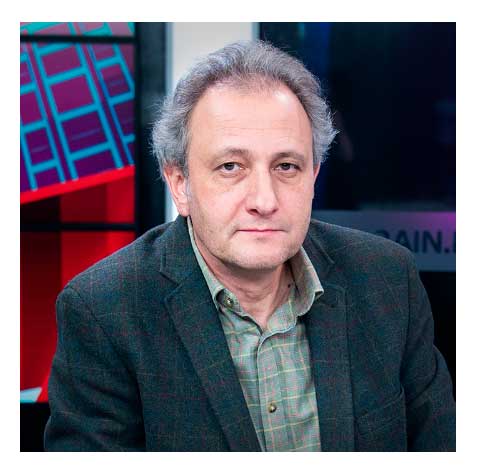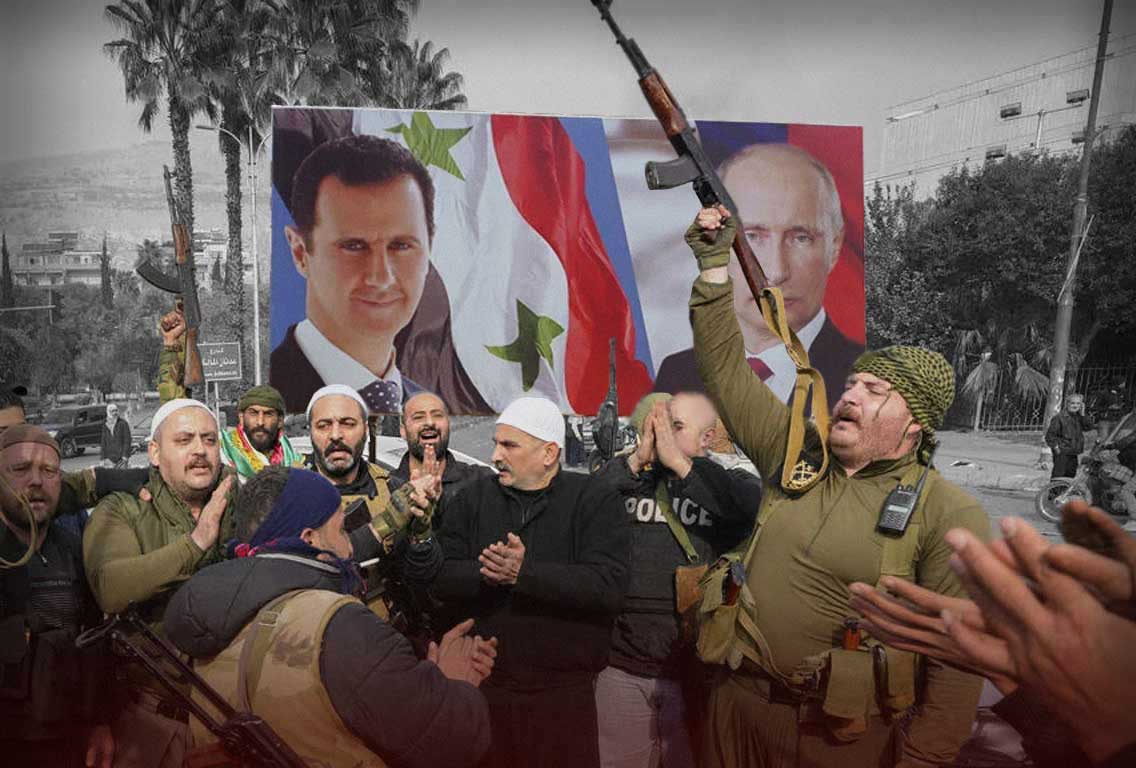 The regime of Bashar al-Assad has fallen. This is unlikely to impress the broad Russian public, who will habitually dismiss the thought that this is a loss for Putin's regime as well. After all, he invested enormous resources in supporting the Syrian dictator. Through the Syrian campaign, he formed an image of a successful controller and sponsor—modeled after the USSR—of Russia's sphere of influence thousands of kilometers from its borders. He spoiled and prepared public opinion for the "special operation," creating a matrix of a victorious military campaign. And now this important success story has failed. But most people don't care—right now, they are not concerned with a Middle Eastern satellite that will likely join, along with his family, the ranks of residents on Rublyovo-Uspenskoye Highway, where ambitious "allies" of the USSR and Russia have historically ended their paths behind high green fences.
The regime of Bashar al-Assad has fallen. This is unlikely to impress the broad Russian public, who will habitually dismiss the thought that this is a loss for Putin's regime as well. After all, he invested enormous resources in supporting the Syrian dictator. Through the Syrian campaign, he formed an image of a successful controller and sponsor—modeled after the USSR—of Russia's sphere of influence thousands of kilometers from its borders. He spoiled and prepared public opinion for the "special operation," creating a matrix of a victorious military campaign. And now this important success story has failed. But most people don't care—right now, they are not concerned with a Middle Eastern satellite that will likely join, along with his family, the ranks of residents on Rublyovo-Uspenskoye Highway, where ambitious "allies" of the USSR and Russia have historically ended their paths behind high green fences.
The list of the year's losses is not exhausted by Assad's Syria. In the ashes of the Karabakh war, Russia's "strategic partner"—Armenia—disappeared. "Chemistry" is now with the Azerbaijani autocrat, but the friendship of leaders is opportunistic, and traditional Caucasophobia in Putin's Russia hasn't gone anywhere. On a domestic level, it's much worse: a migrant is a migrant, whether Azerbaijani or Tajik. Anti-migrant sentiments are consciously cultivated by the authorities, and anti-migration measures are becoming state policy, which the Putin establishment even manages to take pride in. Not long ago, five Azerbaijani labor migrants were detained in Chechnya and almost sent to the combat zone, despite being citizens of Azerbaijan.
By the way, Chechen leader Ramzan Kadyrov also crossed all boundaries in his verbal interventions, defending migrants, "our brothers," criticizing law enforcement "enforcers" in a Prigozhin-like manner, and even mentioning the "loss" of Ukraine and Georgia due to unthought-out policies. This slip is worth its weight in gold, whether it's Freudian or Marxist.

Iran is also a big friend of Putin. But here, too, symbolic politics do not quite match practice: here's one of the latest real-life cases—the beating of Iranian students by police in Kazan. No one considered that they were from an "friendly" country extremely important to the semi-totalitarian Russian regime.
Migrants are one of the key losses, and they are man-made, of the Putin regime. It is estimated that the country lacks 4.8 million working hands. The working-age population of Russia is declining and aging—a long-term trend, not to mention those who have left and gone to the trenches. All these are losses for the labor market and the quality of human capital. But, of course, foreign labor is also leaving.
The influx of labor migrants has decreased, although their total number is still quite large, about 3.5 million people. The outflow has intensified. First, there was the pandemic, then the political "pandemic," Putin's "special military operation." Law enforcement agencies conducted anti-migration raids in 68 regions of Russia. To combat legal and illegal migrants, the parliament has already passed more than a dozen federal laws. More than 20 regions have banned migrants from working in various fields or announced such measures. Authorities in many donor countries, primarily Central Asian republics (Uzbekistan, Tajikistan, Kyrgyzstan), urge their citizens not to go to Russia for work. The costs of living in Putin's Russia outweigh the benefits of working days here.
Among the "country" losses is Israel. Putin was considered almost a philosemite for a long time. His meetings with Benjamin Netanyahu once had a regular character. Speculations about Ukrainian anti-Semitism and the peculiarities of the Holocaust on Ukrainian territory allowed him, at least until February 2022, to occupy a high moral position in the eyes of many Israelis. There are not many Jews in Russia, and with the war, there are even fewer—many representatives of the Jewish intelligentsia are leaving or simply obtaining an Israeli passport in case of urgent evacuation from the country. The problem of anti-Semitism is not one of the most noticeable, although Russian nationalism is historically heavily mixed with anti-Semitism. The main enemy now is not only and not so much "Zionists," but the West as a whole, within it—NATO and the notorious "Anglo-Saxons." Nevertheless, the attitude towards Jews and especially towards Israel has worsened recently. It's not that the Russian people care so much about the fate of the Palestinian people. It's just that some automatic mechanism kicks in: those who are for Putin against Ukraine are usually for Hamas and Hezbollah against Israel. Old dormant instincts are reactivated and awaken.
Turkey, a country important to Putin's Russia in terms of payment flows and necessary imports for everyday life, is also not behaving quite like a partner. Erdogan supports the return of Crimea to Ukraine, and in the case of Syria, he has taken a strongly anti-Assad position and feels like a winner.
Relations with autocrats are difficult; it was easier with the democratic governments of the West once. And a lot came from the western direction, and not threats—technologies, personnel, capital, direct investments, jobs. Was it worth giving this up for the sake of satisfying imperial messianic chimeras and becoming dependent on China and partly the same Turkey?
A small but striking cherry (or hot pepper?) on the cake is Abkhazia. The residents of the satellite did not want to fall into complete economic dependence on the Russian oligarchy and overthrew the country's leadership. All the Kremlin could respond with was to ban the import of tangerines from Abkhazia. The New Year's table for Russians will become much more expensive.
BRICS, CSTO, and other organizational structures designed to showcase Putin's soft power and offer countries of the former USSR, the global South, and the East a model of an alternative world order based on the last battle with colonialism (which, however, is confused by Putin's ideologists with globalization) are not as successful as they seem. Every country has its own selfish interests. If someone wants to give money and offer their friendship—please. Whether it's China, the USA, or Russia, which has signed a space exploration agreement with Burkina Faso. This does not mean that Putin is the master of the "world majority." Such an invented role, like the "majority" itself, is another imperial hallucination.
There are many losses, and the proposed list is not complete. There are probably no acquisitions. One cannot declare "strategic" friendship with North Korea, inflation eating up the growth of overheated salaries, a weak ruble exacerbating inflation, and GDP growing on the production of "finished metal products" unnecessary for the consumer as such.
The year 2025 will be a year of further bleak degradation. Putin will need something uplifting. For example, a victory. But over whom? And in what terms to describe it?
By betting on hard power, Putin has lost soft power. This is the main loss of the year.
* Andrey Kolesnikov is considered a "foreign agent" by the Ministry of Justice of the Russian Federation.
Photo used: "Opposition fighters celebrate the capture of the city by rebels in Damascus," December 8, 2024. AP Photo/Hussein Malla